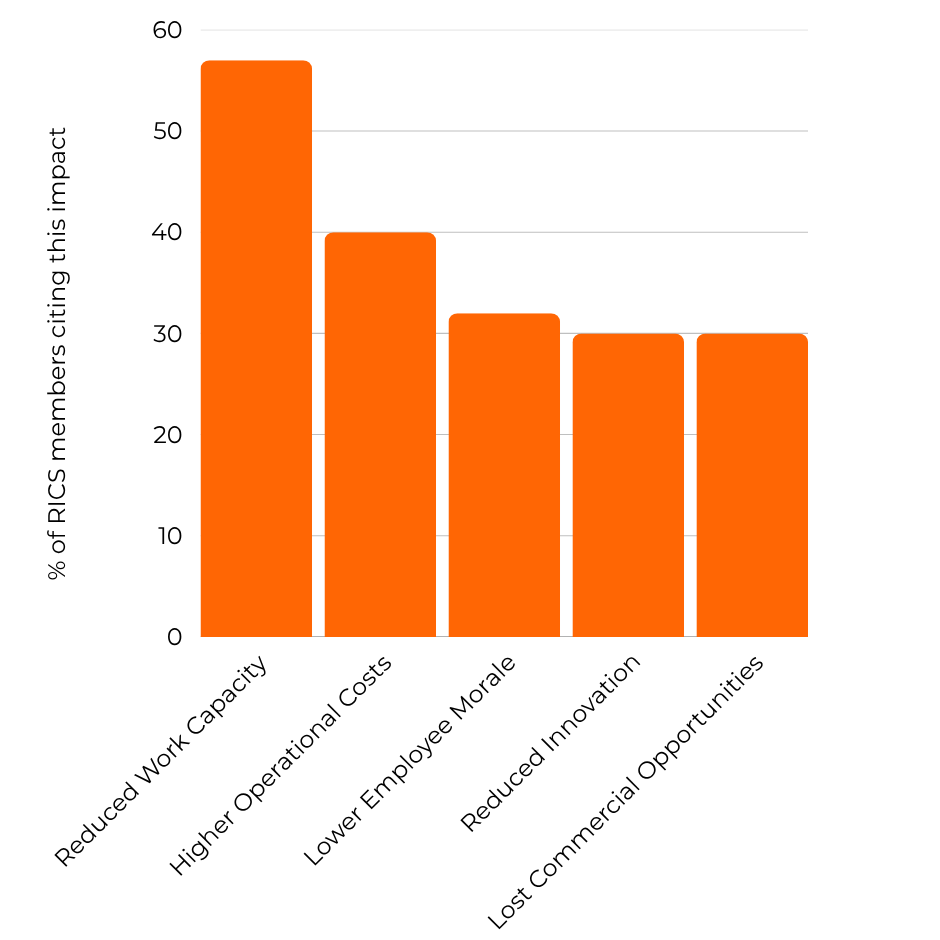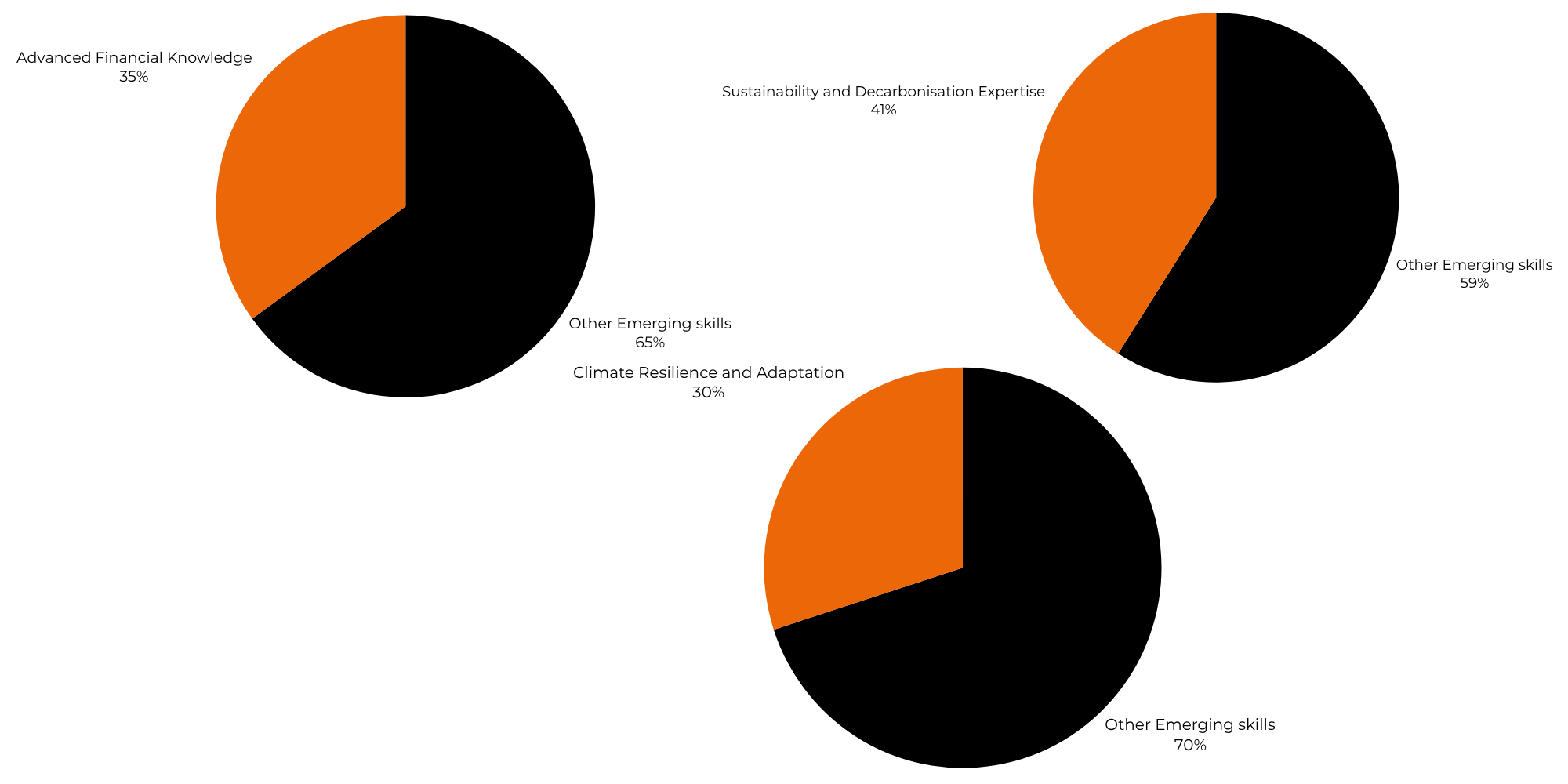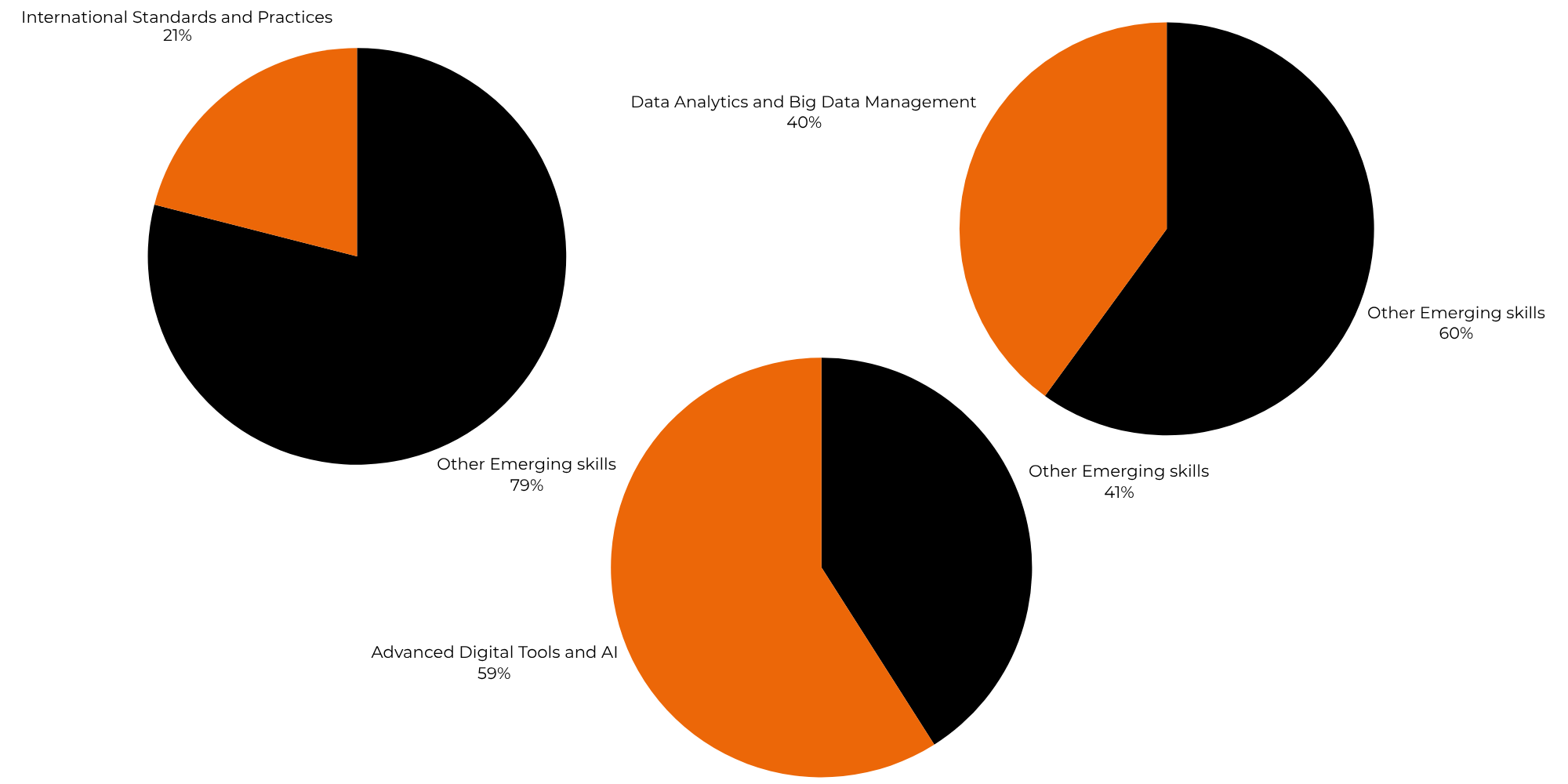
RICS Surveying Skills Report 2025: Navigating the Critical Surveying Skills Shortage in the UK Built Environment
At Atkins Search Recruitment, we’ve placed hundreds of chartered surveyors across the UK in the past 18 months. As specialist recruiters in the built environment sector, we’re uniquely positioned to analyse the RICS Surveying Skills Report 2025 and what it means for professionals seeking RICS careers and employers facing the surveying skills gap.
Executive Summary: The State of RICS Surveying Skills in 2025
The Royal Institution of Chartered Surveyors (RICS) has published its landmark Surveying Skills Report 2025, revealing what many in the built environment sector already suspected: the UK is facing a critical shortage of qualified Quantity Surveyors and Building Surveyors that’s directly impacting project delivery, construction costs, and innovation across the industry.
With 87% of RICS members reporting moderate to critical skills shortages, and the built environment sector contributing approximately 20% of UK GDP, the implications are critical for the future of the UK. This comprehensive analysis from Atkins Search Recruitment examines the findings, explores what’s driving the RICS skills shortage, and provides actionable insights for both Chartered Quantity Surveyors and Building Surveyors, and also employers struggling to fill surveying vacancies.
What is RICS? Understanding the Royal Institution of Chartered Surveyors
RICS Qualifications and Membership Explained
The Royal Institution of Chartered Surveyors is a globally recognised professional body with over 150 years of heritage. RICS sets and maintains the highest standards for professionals working across land, real estate, construction and infrastructure.
RICS membership grades include:
- AssocRICS (Associate) – Entry-level professional qualification
- MRICS (Member) – Full professional membership through Assessment of Professional Competence (APC)
- FRICS (Fellow) – Senior recognition for exceptional contribution to the profession
Why RICS Qualification Matters for Your Surveying Career
Achieving RICS chartered status demonstrates:
- Professional competence validated through rigorous assessment
- Ethical standards with adherence to RICS professional conduct rules
- Technical expertise across diverse surveying disciplines
- Global recognition with RICS members practising in over 140 countries
- Career advancement with higher average salaries. One RICS survey reported that members earned a base salary 38% higher than non-chartered professionals.
At Atkins Search Recruitment, we’ve observed that RICS-qualified candidates receive more interview requests than non-qualified applicants for senior surveying roles in the UK Midlands, Yorkshire, North West, Bristol and London.
The RICS Skills Shortage Crisis: Key Findings from the 2025 Report
The RICS global skills survey, conducted with 2,339 members across all surveying disciplines, paints a concerning picture of workforce capacity in the built environment sector.
Critical Skills Shortage Statistics
27% of RICS members describe the skills shortage as critical, whilst 60% report it as moderate but challenging. Only 2% indicated no skills shortage impact which is a statistically negligible proportion that underscores the sector-wide nature of this crisis.
How the Surveying Skills Gap Impacts UK Construction and Property Sectors
The report identifies five primary consequences of the RICS skills shortage :

Surveying Disciplines Most Affected by Skills Shortages
Quantity surveying and construction faces the most severe capacity constraints, with 68% of respondents reporting reduced work capacity. However, every RICS pathway shows significant impact:
- Infrastructure surveying: 66% reduced capacity
- Management consultancy: 64% reduced capacity
- Project management: 63% reduced capacity
- Planning and Design: 60% reduced capacity
- Building surveying: 57% reduced capacity (but highest concerns about ageing workforce)
- Estimator: 54% reduced capacity
- Residential surveying: 51% reduced capacity
As recruitment specialists covering the East and West Midlands, Yorkshire, North West and South, Atkins Search Recruitment has witnessed a large increase in quantity surveying vacancies compared to pre-pandemic levels, with average time-to-fill extending from 6 weeks to 14 weeks.
Root Causes: Why the UK Faces a Critical RICS Skills Shortage
Understanding the drivers behind the surveying skills gap is essential for developing effective recruitment and retention strategies.
1. Ageing Demographics and Insufficient New Entrants to Surveying
The most significant factor identified in the RICS report is the ageing surveyor workforce combined with inadequate numbers of new professionals entering the industry.
Building surveying shows particular concern, with two-thirds of respondents citing demographic challenges, aligning with our recruitment data at Atkins Search. The problem compounds as experienced RICS members reach retirement without sufficient qualified professionals to replace their expertise and institutional knowledge.
2. Starting Salaries: How RICS Surveying Compares to Other STEM Careers
Approximately half of RICS members aged 17-34 cited lower starting salaries compared to other Science, Technology, Engineering and Mathematics (STEM) fields as a barrier to attracting talent.
Atkins Search presents our annual salary banding guidelines for Construction, Consultancy, and Engineering roles across the Midlands, Yorkshire, the North West, and the South. Stay ahead with insights into industry pay trends and benchmark salaries for 2025-2026.
Click here to receive your 2025 copy
Whilst chartered surveyor salaries (MRICS) are competitive at mid-career levels the 3-5 year qualification pathway with lower initial earnings deters graduates facing student debt.
3. Technological Change Outpacing Surveying Training and Education
The rapid adoption of Building Information Modelling (BIM), artificial intelligence in construction, drone surveying technology and data analytics is creating a skills gap where training programmes haven’t kept pace with industry requirements.
Notably, this was viewed as less problematic in the UK (24% of respondents) compared to other global regions, possibly reflecting stronger continuing professional development (CPD) infrastructure through RICS and UK universities offering surveying degrees.
4. Competition from Related Industries for Built Environment Talent
The built environment sector competes with adjacent industries for graduates with analytical, technical, and commercial skills.
Property technology (PropTech) companies, real estate investment trusts (REITs) and construction technology firms frequently offer more attractive packages, flexible working arrangements and faster career progression than traditional surveying practices.
RICS Pathways and Career Opportunities: Attracting the Next Generation
The RICS report identifies specific strategies for making surveying careers more appealing to young people and career changers.
Top 10 Strategies to Attract Talent to RICS Surveying Careers
Based on member feedback, RICS and the sector should prioritise:
- Expanding Surveying Apprenticeships and Internships
- Highlighting Clear Career Pathways
- Mentorship Programmes
- Modernising University Curricula
- Success Stories and Role Models
- Practical Workshops for Students
- Scholarships and Grants
- Careers Fairs and Open Days
- Enhanced Online Presence
Upskilling the Existing RICS Workforce: Addressing Current Capability Gaps
Whilst attracting new talent is critical, 45% of survey respondents emphasised that upskilling existing surveyors is equally important for addressing capacity constraints.
Core Skills Gaps in Graduate and Junior Surveyors

RICS members identified five priority areas where new entrants need strengthening:
- Communication, negotiation, report writing, client management
- Practical application of surveying principles and methodologies
- Understanding business drivers, profitability and market dynamics
- Budgeting, cost management, financial analysis
- Construction law, planning regulations, building control
These findings suggest that surveying degree programmes and APC training should place greater emphasis on commercial and soft skills alongside technical competencies.
At Atkins Search Recruitment, we’ve noticed that candidates demonstrating strong communication skills and commercial awareness secure job offers faster than those with purely technical qualifications.
RICS CPD Requirements and Professional Development
All RICS members must complete 20 hours of Continuing Professional Development (CPD) annually, including at least 10 hours of formal learning. This ensures chartered surveyors maintain currency with evolving practices, regulations and technologies.
The RICS report highlights appetite for upskilling, particularly in emerging technologies and sustainability, suggesting CPD programmes should expand offerings in these areas.
Future Skills for Surveyors: Preparing for the Next Decade
The built environment is transforming rapidly, driven by climate change and digital innovation. The RICS report identifies critical emerging skills for the profession.
Top 6 Emerging Skills for RICS Surveyors (2025-2035)


Survey respondents ranked emerging skills by importance:
- Machine learning, automation, predictive analytics
- Cross-border projects, global best practices
- Interpreting complex datasets for decision-making
- ESG investing, climate risk assessment, alternative funding models
- Flood risk, thermal performance, resilient design
- Net-zero carbon, embodied carbon assessment, circular economy
How Artificial Intelligence is Transforming Surveying Practice
The RICS report reveals overwhelmingly positive attitudes towards AI amongst surveying professionals:
67% of respondents agree that AI will help surveyors deliver greater value to clients, with only 4% disagreeing strongly.
This enthusiasm is highest amongst:
- Management consultancy (79%)
- Construction surveying (74%)
- Younger professionals aged 17-34 (81%)
Addressing AI Concerns: What RICS Members Really Think
Whilst positive overall, the report explores potential concerns:
51% reject the notion that they’re concerned about AI’s impact on their role, whilst 56% reject feeling overwhelmed by technological change.
Younger professionals (17-34) are most confident, with:
- 57% disagreeing that AI concerns them personally
- 62% disagreeing that technology change feels overwhelming
Only 9% strongly agree they’re concerned about AI’s impact on their careers which is a remarkably low figure suggesting the profession is embracing rather than fearing technological advancement.
The key message for aspiring RICS professionals: technology skills are becoming as fundamental as traditional surveying skills.
RICS Assessment of Professional Competence (APC): Your Route to Chartered Status
For those considering a quantity surveying career or building surveying career, understanding the RICS qualification process is essential.
What is the RICS APC?
The Assessment of Professional Competence is the route to achieving MRICS chartered membership. It typically involves:
Duration: 24 months minimum (graduate route) or 48 months (technical route)
Components:
- Structured training with employer and counsellor support
- Competency development across mandatory and optional areas relevant to your pathway
- Case study submission demonstrating application of skills
- Final Assessment interview with experienced RICS assessors
RICS Pathways and Surveying Specialisms
RICS offers numerous professional pathways reflecting different surveying disciplines:
Property and Land:
- Residential Surveying
- Commercial Real Estate
- Valuation
- Rural Surveying
- Building Surveying
Construction and Engineering:
- Quantity Surveying and Construction
- Project Management
- Building Control
- Geomatics (Land Surveying)
Specialist Areas:
- Facilities Management
- Planning and Development
- Environmental Assessment
- Infrastructure
- Property Finance and Investment
Each pathway has specific competency requirements aligned with practice areas, ensuring RICS members possess relevant, up-to-date expertise.
RICS APC Pass Rates and Success Strategies
Whilst RICS doesn’t publish official pass rates for those sitting their assessment the first-time, but industry estimates suggest first-time pass rates range from 65-75% depending on pathway and preparation quality. However, in 2024, the average pass rate for all assessments and all pathways was 64%.
Geographical Analysis: RICS Skills Shortages Across UK Regions
Whilst the RICS report provides global data, UK-specific insights reveal regional variations.
Regional Differences in Surveying Skills Shortages
UK respondents particularly emphasised:
- Apprenticeships as the primary solution (higher than other countries)
- Career pathway visibility as crucial for attraction
- Demographic challenges more pronounced than globally
RICS Recruitment Hotspots: Where Demand Exceeds Supply
Infrastructure surveying and quantity surveying job vacancies are particularly acute in:
- HS2 corridor (Birmingham to London)
- Northern Powerhouse regions (Manchester, Leeds, Newcastle)
- Major housing growth areas (Cambridge, Oxford, Milton Keynes)
Retention Strategies to Address Surveying Skills Shortages
The RICS report identifies that 32% cite lower employee morale as an impact of skills shortages. This can be often driven by overwork and burnout.
Retention tactics that work:
- Workload management
- Career development
- Recognition programmes
- Competitive reviews with our Atkins Search annual salary benchmarking
- Succession planning
- Work-life balance
- Technology adoption
RICS and Government Policy: Collaborative Solutions to the Skills Crisis
The report emphasises that no single construction organisation can resolve the skills shortage as it requires coordinated action from multiple stakeholders.
RICS Initiatives to Address the Surveying Skills Gap
Current programmes:
- RICS Futures: Careers promotion for young people
- STEM Ambassador Programme: RICS members visiting schools
- Inclusive Employer Quality Mark: Promoting diversity in recruitment
- B.E. Inclusive Initiative: Collaborative action plan with other built environment professional bodies through 2030
- APC Review: Reforming qualification process to improve accessibility
- New Professional Standards: Including “Responsible use of artificial intelligence in surveying practice” (effective March 2026)
Government Support for Built Environment Skills Development
UK Government initiatives relevant to surveying:
- Construction Skills Fund: Supporting training programmes
- Apprenticeship Levy: Funding employer-led training
- T-Levels in Construction: Technical qualifications pathway
- Institute for Apprenticeships and Technical Education: Setting standards
The report calls for enhanced collaboration between government, education, professional bodies, and industry to achieve the necessary scale of change.
RICS Professional Standard on AI (Effective March 2026)
The forthcoming “Responsible use of artificial intelligence in surveying practice” standard will.
- Establish ethical guidelines for AI deployment
- Ensure transparency in AI-assisted decision-making
- Maintain professional accountability
- Protect client interests
- Support members in adopting technology safely
This demonstrates RICS’ proactive approach to technological transformation rather than resistance. The standard becomes effective on March 9, 2026. It applies to all surveying professions, including valuation, quantity surveying and building surveying. Firms are required to assess and document whether an AI system’s outputs “materially influence” the delivery of professional advice or reports. If the answer is yes, the full standard applies.
Sustainability Expertise: The Fastest-Growing Surveying Specialism
41% of RICS members identified sustainability and decarbonisation as a critical emerging skill, ranking second only to AI. The UK’s net-zero by 2050 commitment creates massive demand for professionals who can:
Measure carbon:
- Embodied carbon assessment of construction materials
- Operational carbon analysis of building performance
- Whole-life carbon evaluation
Design for sustainability:
- Retrofit strategies for existing buildings
- Circular economy principles
- Nature-based solutions integration
Advise on compliance:
- MEES regulations
- EPC requirements
- Planning policy sustainability standards
- BREEAM and LEED certifications
Value sustainability:
- Green premium assessment
- ESG risk evaluation for investors
- Climate resilience impact on property values
Atkins Search Recruitment’s Perspective on the RICS Skills Crisis
As specialist construction recruiters placing RICS-qualified surveyors across the East Midlands, West Midlands, North West, London, Bristol and Yorkshire, we’ve witnessed the skills shortage intensify over the past five years.
What We’re Seeing in the Market
- Salary expectations increasing annually above general inflation.
- Remote/hybrid working now a deal-breaker. This is now a key factor for candidates when they’re deciding whether to go for a job.
- Counteroffers increasing in past two years as employers fight to retain staff.
What This Means for Your Construction Career
The current market is firmly candidate-driven, which means your skills and experience are in demand. However, that also means it’s more important than ever to make informed career decisions.
Our Advice for RICS Professionals:
- Think long-term and consider the full package, including flexibility, culture and progression pathways.
- Think ahead about your reasons for moving and stick with it. Approximately 80% of candidates who accept a counter-offer end up leaving within just six months and 50% are actively looking for a new job again within 60 days.
Partner with a specialist construction recruiter. we can help you identify roles that align with both your goals and market conditions.
At Atkins Search, we work closely with RICS-qualified professionals to understand their career ambitions and match them with leading employers across the UK. Whether you’re considering your next move or simply exploring the market, we provide confidential guidance, salary benchmarking and access to exclusive opportunities not advertised elsewhere.
If you’d like an informal discussion about current opportunities or salary expectations, please contact our specialist team.
Alternatively browse our latest exclusive construction job opportunities.


